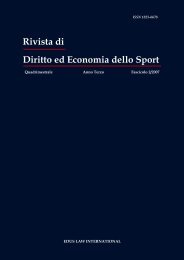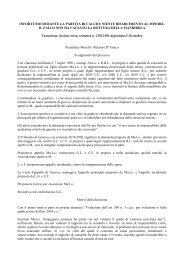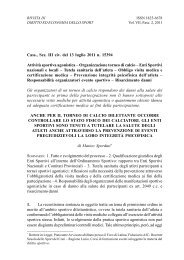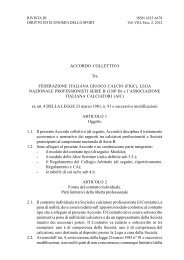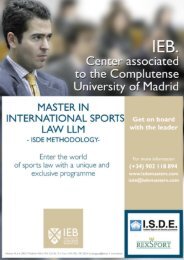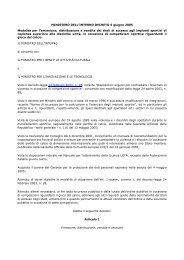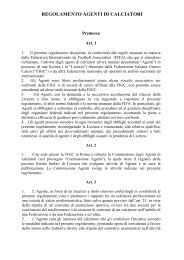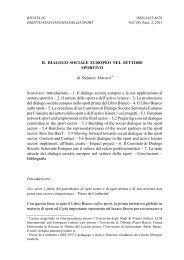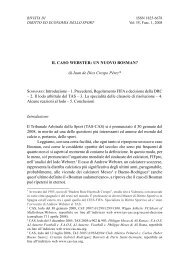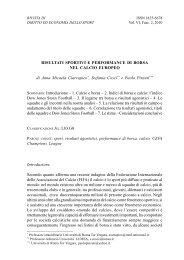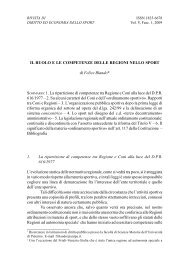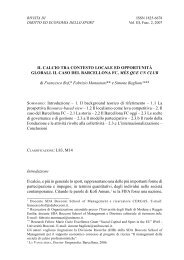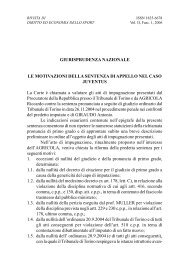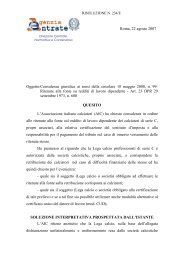European Sports Law and Policy Bulletin THE BERNARD ... - Slpc.eu
European Sports Law and Policy Bulletin THE BERNARD ... - Slpc.eu
European Sports Law and Policy Bulletin THE BERNARD ... - Slpc.eu
Create successful ePaper yourself
Turn your PDF publications into a flip-book with our unique Google optimized e-Paper software.
<strong>European</strong> <strong>Sports</strong> <strong>Law</strong> <strong>and</strong> <strong>Policy</strong> <strong>Bulletin</strong> 1/2010 - Chapter VIII 145activity in the territory of another Member State. 7National provisions which preclude or deter a national of a Member Statefrom leaving his country of origin in order to exercise his right to freedom ofmovement, therefore, constitute restrictions on said free movement even if theyapply without regard to the nationality of the workers concerned.The French sport rules applicable to Mr. Bernard, regarding «jou<strong>eu</strong>r espoir»,state that at the end of his training period, he is required under pain of being suedfor damages, to sign a professional contract with the club which trained him.These rules somewhat restrict the player’s right to free movement. 8 They arecontrary to the principle of freedom of movement enshrined in the Treaty on theFunctioning of the <strong>European</strong> Union.The Court recalls that a measure which constitutes an obstacle to freedomof movement for workers can be accepted only if it pursues a legitimate aimcompatible with the Treaty <strong>and</strong> is justified by «overriding» reasons in the publicinterest.Further, even if that is the case, the application of that measure would stillhave to be such as to ensure achievement of the objective in question <strong>and</strong> not gobeyond what is necessary for that purpose. 9More precisely the Advocate General in her opinion states: «Nationalmeasures liable to hinder or make less attractive the exercise of fundamentalfreedoms guaranteed by the Treaty may none the less escape prohibition if theypursue a legitimate aim compatible with the Treaty. In order for that to be so,however, they must fulfil four further conditions: they must be applied in a nondiscriminatorymanner; they must be justified by overriding reasons in the publicinterest; they must be suitable for securing the attainment of the objective whichthey pursue; <strong>and</strong> they must not go beyond what is necessary for that purpose». 10With regard to professional sport, the Court has already had occasion in theBosman case to hold that, in view of the considerable social importance of sportingactivities <strong>and</strong> in particular football in the <strong>European</strong> Union, the objective ofencouraging the recruitment <strong>and</strong> training of young players must be accepted aslegitimate. 11In considering whether a system which restricts the freedom of movementof such players is suitable to ensure that the said objective is obtained <strong>and</strong> does notgo beyond what is necessary to reach it, account must be taken of the specificcharacteristics of sport in general, <strong>and</strong> football in particular, <strong>and</strong> of their social <strong>and</strong>educational function.____________________7ECJ, Bosman, cited above, para. 94; Case C-109/04 Kranemann [2005], ECR I-2421, para. 25;<strong>and</strong> Case C-208/05 ITC [2007], ECR I-181, para. 31.8ECJ, Bernard, para. 35.9ECJ, Bernard, para. 38; ECJ, Bosman, para. 104.10Opinion of Advocate General Sharpston, 16 July 2009, Olympique Lyonnais v Olivier Bernard<strong>and</strong> Newcastle United FC, C-325/08, not yet published in the ECR, para. 44.11ECJ, Bosman, para. 106.



